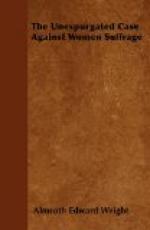When woman suffrage was adopted in these countries it was adopted in some for one reason, in others for another. In some it was adopted because it appealed to the doctrinaire [theoretical] politician as the proper logical outcome of a democratic and Socialistic policy. In others it was adopted because opportunist politicians saw in it an instrument by which they might gain electioneering advantages. So much was this the case that it sometimes happened that the woman’s vote was sprung upon a community which was quite unprepared and indifferent to it.
The cause of woman suffrage was thus in the countries of which we speak neither in its inception nor in its realisation a question of revolt of woman against the oppression of man. It had, and has, no relation to the programmes of the militant suffragists as set out at the outset of this letter.
By virtue of this, all the evils which spring from the embroiling of man and woman have in the countries in question been conspicuously absent.
Instead of seeing himself confronted by a section of embittered and hostile women voters which might at any time outvote him and help to turn an election, man there sees his women folk voting practically everywhere in accordance with his directions, and lending him a hand to outvote his political opponent.
Whether or no such voting is for the good of the common weal is beside our present question. But it is clearly an arrangement which leads to amity and peace between a man and his womenkind, and through these to good-will towards all women.
In England everything is different.
If woman suffrage comes in here, it will have come as a surrender to a very violent feminist agitation—an agitation which we have traced back to our excess female population and the associated abnormal physiological conditions.
If ever Parliament concedes the vote to woman in England, it will be accepted by the militant suffragist, not as an eirenicon, but as a victory which she will value only for the better carrying on of her fight a outrance [to the bitter end] against the oppression and injustice of man.
A conciliation with hysterical revolt is neither an act of peace; nor will it bring peace.
Nor would the conferring of the vote upon women carry with it any advantages from the point of view of finding a way out of the material entanglements in which woman is enmeshed, and thus ending the war between man and woman.
One has only to ask oneself whether or not it would help the legislator in remodelling the divorce or the bastardy laws if he had conjoined with him an unmarried militant suffragist as assessor.




